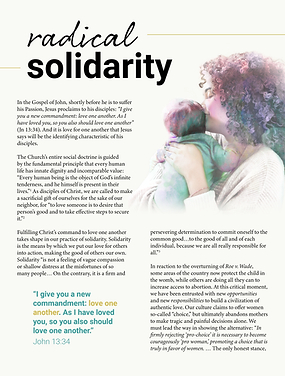
Radical Solidarity
In the Gospel of John, shortly before he is to suffer his Passion, Jesus proclaims to his disciples: “I give you a new commandment: love one another. As I have loved you, so you also should love one another” (Jn 13:34). And it is love for one another that Jesus says will be the identifying characteristic of his disciples.
The Church’s entire social doctrine is guided by the fundamental principle that every human life has innate dignity and incomparable value: “Every human being is the object of God’s infinite tenderness, and he himself is present in their lives.”[1] As disciples of Christ, we are called to make a sacrificial gift of ourselves for the sake of our neighbor, for “to love someone is to desire that person's good and to take effective steps to secure it.”[2]
Scroll down for other formats of this article!
Fulfilling Christ’s command to love one another takes shape in our practice of solidarity. Solidarity is the means by which we put our love for others into action, making the good of others our own. Solidarity “is not a feeling of vague compassion or shallow distress at the misfortunes of so many people… On the contrary, it is a firm and persevering determination to commit oneself to the common good…to the good of all and of each individual, because we are all really responsible for all.”[3]
In reaction to the overturning of Roe v. Wade, some areas of the country now protect the child in the womb, while others are doing all they can to increase access to abortion. At this critical moment, we have been entrusted with new opportunities and new responsibilities to build a civilization of authentic love. Our culture claims to offer women so-called “choice,” but ultimately abandons mothers to make tragic and painful decisions alone. We must lead the way in showing the alternative: “In firmly rejecting ‘pro-choice’ it is necessary to become courageously ‘pro woman,’ promoting a choice that is truly in favor of women. … The only honest stance, in these cases, is that of radical solidarity with the woman. It is not right to leave her alone.” [4]
Experience shows that when a mother is supported, “she is even capable of heroism.”[5] Radical solidarity compels us to come alongside vulnerable mothers in profound friendship, compassion, and support for both them and their preborn children. It requires us to address the fundamental challenges that lead an expectant mother to believe she is unable to welcome the child God has entrusted to her. We must do all we can to provide mothers, children, and families with the support they need to flourish. This cannot be accomplished by laws or policy alone, but requires the continual transformation of our own hearts, recognizing in every person the face of Christ, and placing their needs before our own.
Radical solidarity “refers to something more than a few sporadic acts of generosity. It presumes the creation of a new mindset.”[6] A culture of radical solidarity “gets involved by word and deed in people’s daily lives… and it embraces human life, touching the suffering flesh of Christ in others.”[7] We each have our particular gifts, role, and obligation within the Body of Christ to help build a culture of life. We must honestly ask ourselves, “What radical, out-of-the-ordinary, actions have I taken to help a pregnant or parenting mother in need, or to proactively contribute to a culture of life in some other way?”
Inspired by Christ’s own example of love, may we “enter fully into the fabric of society, sharing the lives of all, listening to their concerns, helping them materially and spiritually in their needs, rejoicing with those who rejoice, weeping with those who weep.”[8] May we work together to bring about a culture of life through radical, sacrificial, Christ-like love.
[1] Pope Francis, Evangelii gaudium (The Joy of the Gospel), no. 274.
[2] Pope Benedict XVI, Caritas in veritate (Charity in Truth), no. 7.
[3] Pope John Paul II, Sollicitudo rei socialis (On Social Concern), no. 38.
[4] Pope John Paul II, Crossing the Threshold of Hope, p. 207.
[5] Pope John Paul II, Crossing the Threshold of Hope, p. 207.
[6] Pope Francis, Evangelii gaudium (The Joy of the Gospel), no. 188.
[7] Pope Francis, Evangelii gaudium (The Joy of the Gospel), no. 24.
[8] Pope Francis, Evangelii gaudium (The Joy of the Gospel), no. 269.
Scripture texts in this work are taken from the New American Bible, revised edition © 2010, 1991, 1986, 1970 Confraternity of Christian Doctrine, Washington, D.C. and are used by permission of the copyright owner. All rights reserved. Used with permission. Excerpts from Evangelii gaudium (The Joy of the Gospel), © 2013; Caritas in veritate (Charity in Truth), © 2009; and Sollicitudo rei socialis (On Social Concern), © 1987. Libreria Editrice Vaticana. Used with permission. All rights reserved. Pope John Paul II. 2005. Crossing the Threshold of Hope. Edited by Alfred A. Knopf. New York: Alfred A. Knopf, Inc. All rights reserved.
Copyright © 2023, United States Conference of Catholic Bishops, Washington, D.C. All rights reserved.

